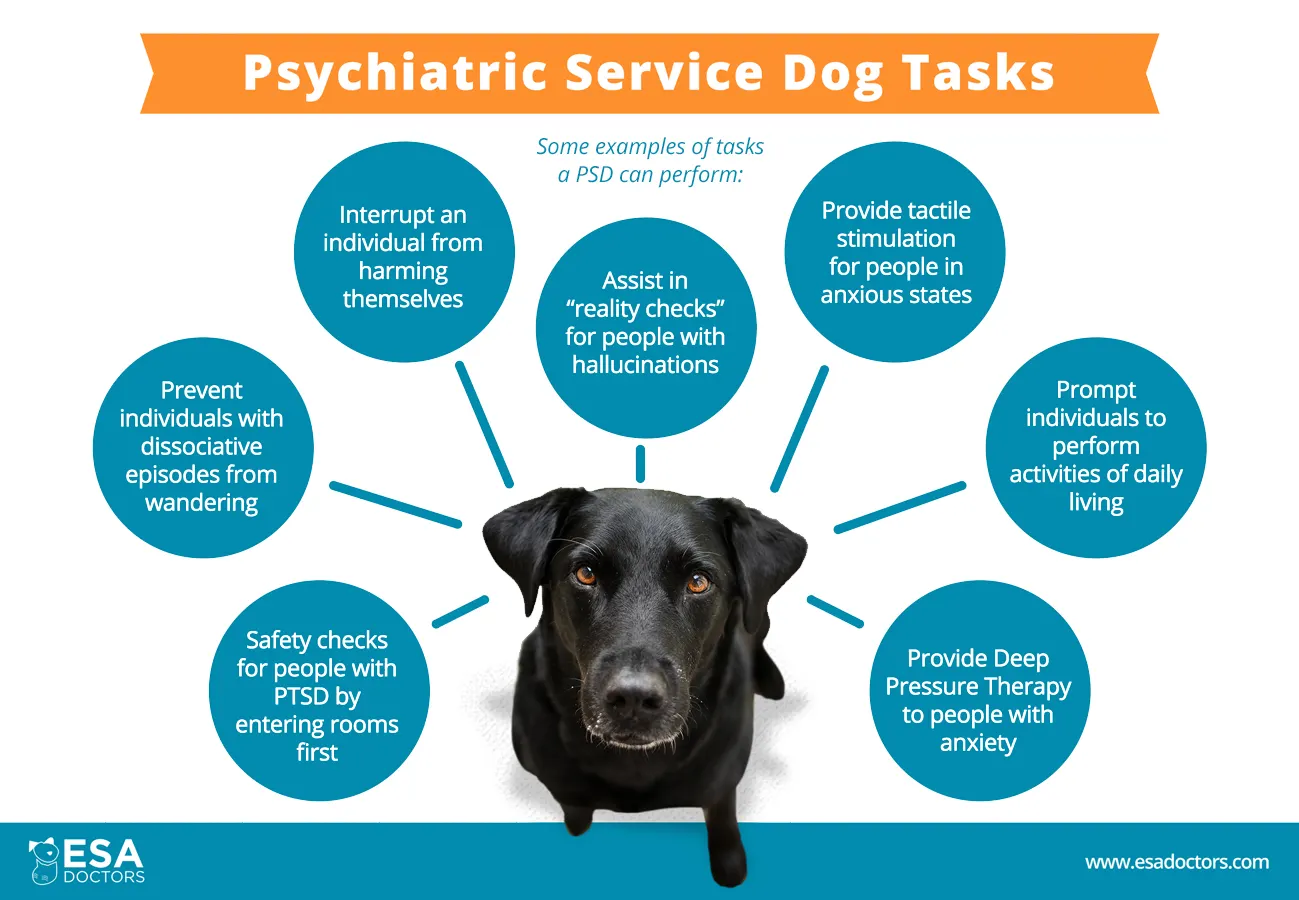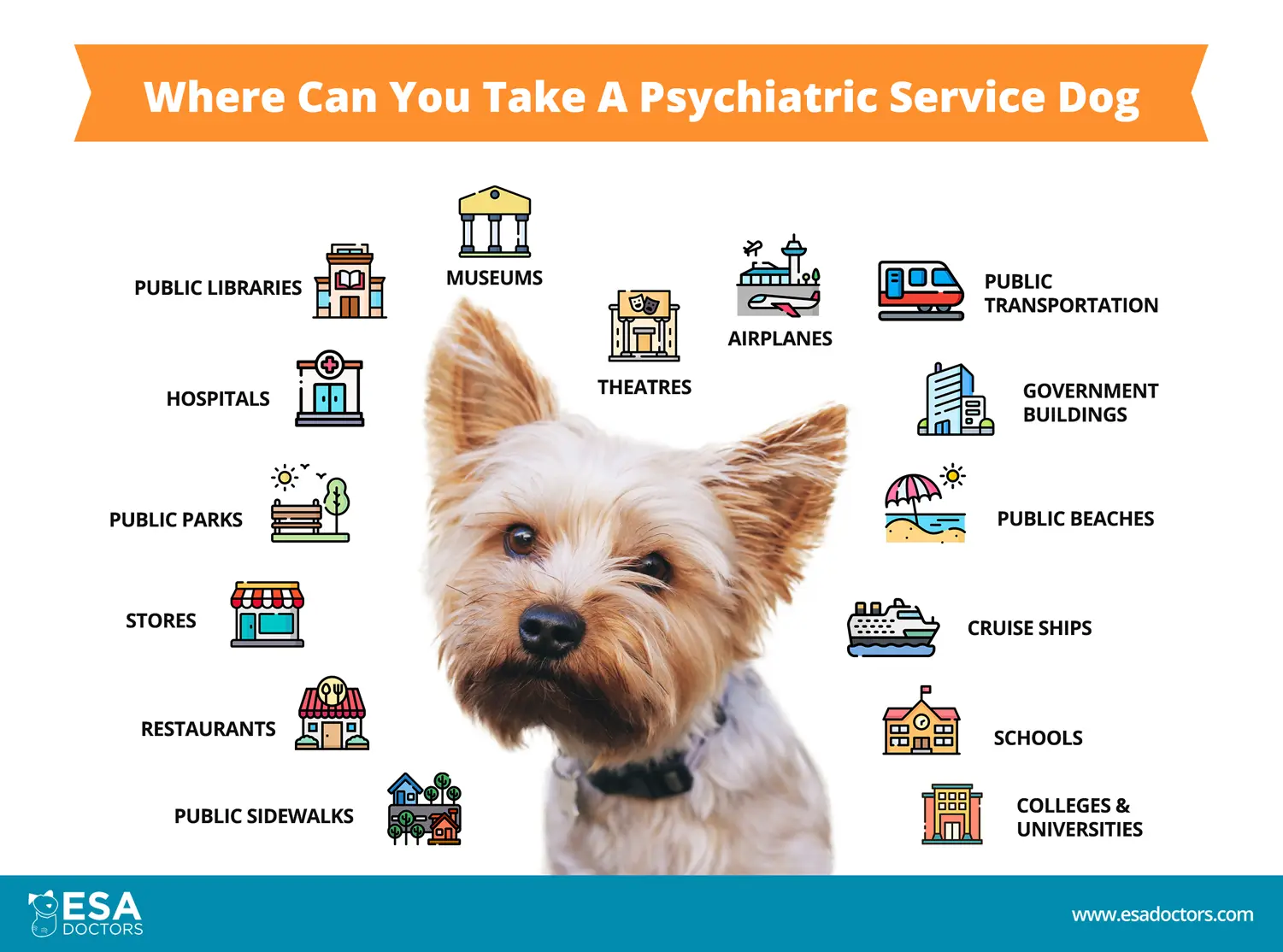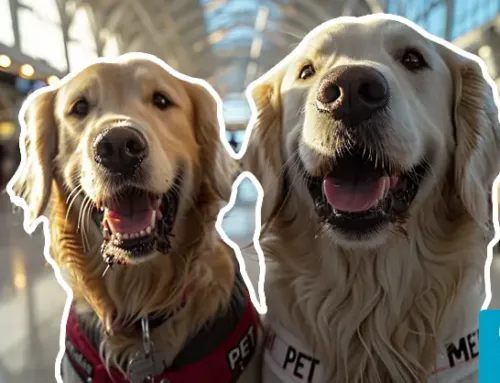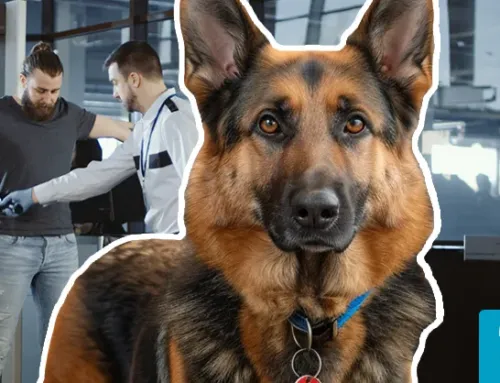Unlike emotional support animals (ESA), you can take a psychiatric service dog (PSD) anywhere a service dog can go. Whether it’s on an airplane, in a hotel, or out in a public park, a psychiatric service dog can accompany its handler just about anywhere.
What is a Psychiatric Service Dog?
When most people think of service dogs, what comes to mind are guide dogs for the visually impaired or mobility service dogs for people with difficulty moving around. Psychiatric service dogs, however, fall under the same category as all service dogs by performing vital tasks for people with a mental or emotional disability, such as severe anxiety, PTSD, or depression. Therefore, they are protected by the same federal laws as all service dogs.

Americans with Disabilities Act (ADA)
The Americans with Disabilities Act (ADA) protects the rights of people with disabilities and allows them to take service dogs to almost any publicly accessible place. The ADA defines service dogs as dogs that are “trained to do work or perform tasks” for individuals who have a disability. For example, psychiatric service dogs who assist people who have Post Traumatic Stress Disorder (PTSD) may receive training to help during an anxiety attack or obtain medication.
Psychiatric service dogs are not considered pets by the ADA. Instead, they’re “working animals” that perform vital activities for people with disabilities. Because of this status, the ADA laws protect service dogs anywhere the public goes. This includes businesses, nonprofit organizations, and government property that’s open to the public. For instance, psychiatric dogs can enter stores, hotels, parks, theatres, and restaurants.
Air Carrier Access Act (ACA)
The Air Carrier Access Act (ACA) protects the rights of individuals with service dogs when they travel. Airlines must allow service dogs into their cabins free of charge. Airlines must recognize service dogs as working animals and not as pets. Pet fees and pet restrictions do not apply to service dogs.
However, airlines may require prior notification that a service dog will travel with its handler on a flight. The PSD handler will also need to complete and submit the DOT’s Service Animal Air Transportation Form to the airline before boarding.
Airlines may deny a service dog if it causes significant disruption, poses a direct threat to others, or violates health requirements between states or countries. When in doubt, it’s best to consult with the airline before making travel arrangements.
Fair Housing Act
Under the Fair Housing Act (FHA), psychiatric service dogs qualify as an assistance animal. Psychiatric service dogs may reside with their handler in housing situations where no pets are typically allowed. Rental pet fees don’t apply to psychiatric service dogs, and property owners can’t refuse renters because of their service dogs. Because a psychiatric service dog is vital to their handler’s well-being, the FHA protects their ability to live with their handler.
If you are interested in a Psychiatric Service Dog Letter, we can connect you with a licensed healthcare provider. Click below to get started.
Psychiatric Service Dogs in Public Areas
What sets service dogs apart from other dogs are two main factors:
- Service dogs work with an assigned handler (who has a disability) and perform specific tasks for their handler.
- Service dogs receive months (sometimes years) of extensive training to learn how to fulfill those tasks and maintain appropriate behavior in public.
Like all service dogs, psychiatric service dogs undergo comprehensive training, including public access training. This public access training enables service dogs to work in public areas. Service dogs are working when out in the community — even when it looks like they’re simply accompanying their handler.
Their training lets service dogs tolerate distractions and maintain their behavior, whether they’re in a crowd or out in the woods, and perform their assigned vital tasks. Therefore, service dogs can go wherever their handler goes, as long as they maintain safe and non-disruptive behavior. Some examples of areas that are accessible to psychiatric service dogs are:
- Public sidewalks
- Restaurants (except for kitchens or prep areas)
- Stores
- Public parks
- Hospitals and Physician’s Offices (unless they pose an infection control or health issue, like in an operating room, ICU, or laboratory)
- Public libraries
- Museums
- Theatres
- Airplanes
- Public Transportation (buses, trains, etc.)
- Government buildings and property
- Beaches
- Cruise ships and ferries
- Public and private schools
- Colleges and universities
A service dog must comply with leash laws or any leash rules unless a leash would prevent the dog from carrying out its tasks. Whenever a psychiatric service dog is off the leash, the dog must be under the control of its handler.
Where Psychiatric Service Dogs are Not Allowed
An establishment may ask a handler to remove their service dog from the premises if the dog becomes a legitimate safety issue or is excessively disruptive. For example, a service dog’s handler may be asked to remove the dog if it displays aggressive or disruptive behavior (urinating or defecating indoors, growling, excessive barking, etc.).
A psychiatric service dog must be under the control of its handler at all times.
ESA Doctors, est. 2015
According to the ADA, places of worship like churches and synagogues are exempt from the laws regarding service animals. Similarly, private clubs are also exempt. Places of employment must provide reasonable accommodations to employees with disabilities.
Psychiatric Service Dogs in the Community
It’s important to remember that psychiatric service dogs are not pets, emotional support dogs, or therapy dogs. Unlike other pets, psychiatric service dogs are trained to perform crucial tasks for people with a disability, making them vital to a person’s health and safety.
PSD owners do not need to register or certify their psychiatric service dogs. However, some owners opt to obtain PSD letters from a licensed healthcare professional who has evaluated whether they have a qualifying disability for a service dog.
Want to know if you qualify for a Psychiatric Service Dog?
Get your PSD Letter in three easy steps.











Leave a Comment